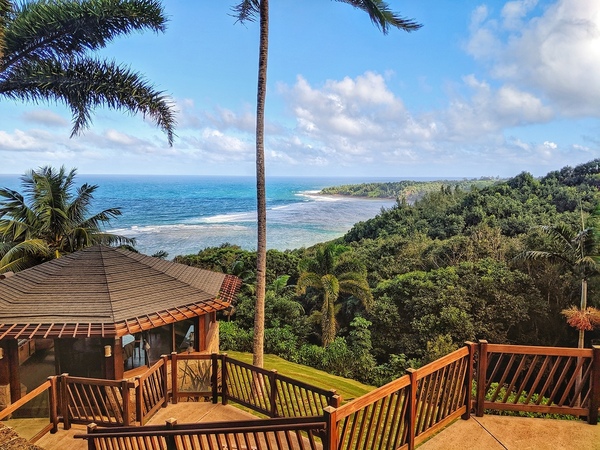
Notre Dame Law School’s Religious Liberty Clinic filed an amicus brief in the U.S. Court of Appeals for the Ninth Circuit in support of the right of Spirit of Aloha Temple, a Hindu organization, and its founder, Fredrick Honig, to use their property for religious practice.
The case, Spirit of Aloha Temple v. County of Maui, challenges the denial of the Temple’s application for a permit to use its property for religious services and other sacred ceremonies. The Temple is a religious organization that adheres to the Integral Yoga movement, a modern branch of the ancient Hindu yogic tradition. Its founder is a Hindu monk who cares for the Temple’s property.
The Temple had long used its property to host religious services, including baptisms and weddings, and to offer classes on spiritual belief. But County officials later told the Temple that it was not allowed to engage in religious services, ceremonies, yoga, and other religious and educational events on its property.
After the County denied the Temple’s request for a permit to allow it to continue its religious practice, the Temple sued in federal court, seeking relief under the Religious Land Use and Institutionalized Persons Act (RLUIPA). The district court denied their request, concluding that the County had not “substantially burdened” the religious exercise of the Temple and its founder.
Spirit of Aloha Temple v. County of Maui (9th Cir.)
Click on the link above to read the amicus brief that Notre Dame Law School’s Religious Liberty Clinic filed in the U.S. Court of Appeals for the Ninth Circuit.
The Notre Dame Religious Liberty Clinic’s amicus brief asserts that the district court wrongly limited the religious protections offered by RLUIPA, which tightly circumscribes the government’s authority to substantially burden a person’s religious exercise through land-use decisions. The brief argues that the district court fundamentally distorted what it means for the government to “substantially burden” a person’s religious exercise on his land.
“The very point of RLUIPA is to provide robust protections for groups like the Temple,” said John Meiser, director of Notre Dame Law School’s Religious Liberty Clinic. “Unfortunately, federal courts often undermine those protections by either misunderstanding or misapplying the law.”
The Clinic’s brief explains that, to determine whether a land-use regulation unlawfully imposes a substantial burden on a plaintiff’s religious exercise, courts must conduct a holistic and nuanced inquiry. That analysis asks whether and to what extent the government has impaired the plaintiff’s ability to fulfill a religious need. The brief argues that the district court badly misconstrued that inquiry by ignoring the circumstances of the case and imposing hurdles that RLUIPA does not create — and by ultimately sending this complicated legal determination to a jury.
“This case is now ten years old, and the Ninth Circuit has already told the district court to apply RLUIPA broadly in favor of safeguarding religious exercise,” Meiser added. “Unfortunately, another correction is now needed to ensure the promise of those protections.”
“The Temple believes that its land is uniquely sacred and wishes to share that holiness with others,” said Meredith Holland Kessler, staff attorney for the Religious Liberty Clinic. “The law clearly protects the Temple’s freedom to do so by using its property to host sacred ceremonies and other religious offerings.”
Religious Liberty Clinic student fellows Sakethram Desabhotla, Jared Huber, Tess Skehan, and Timothy Steininger, assisted Meiser and Kessler in preparing the brief.
The Religious Liberty Clinic’s brief urges the Ninth Circuit to correct the district court’s fundamental misunderstanding of RLUIPA’s religious protections, both to fix the district court’s erroneous decision and to ensure that other courts will not repeat the same mistake.
“Supporting Spirit of Aloha Temple’s efforts to give effect to statutory protections that permit religious people to use their land in religious ways is crucial,” said Huber, a third-year law student in the Clinic. “If governments can flout these protections, then the faithful may face challenges in building churches, religious schools, or using their land for other religious purposes.”
“It can sometimes be difficult for minority religions to fight for their rights,” said Desabhotla, a second-year law student in the Clinic. “Ensuring that our legal protections apply equally to all religions is incredibly important for furthering the pluralistic ethos of the United States. It was very enriching for me to promote this ideal in this case.”
About the Notre Dame Law School Religious Liberty Clinic
The Notre Dame Law School Religious Liberty Clinic represents individuals and organizations from all faith traditions to promote not only the freedom for people to hold religious beliefs but also their fundamental right to express those beliefs and to live according to them. Students in the Clinic work under the guidance of Notre Dame Law School faculty and staff to provide advice, counsel, and advocacy on a broad array of matters related to religious freedom in the United States and abroad. The Religious Liberty Clinic has participated in proceedings at all levels of federal and state courts, in administrative agencies, and before foreign courts and other governmental bodies around the world.
Learn more about the Religious Liberty Clinic at religiousliberty.nd.edu/clinic/.